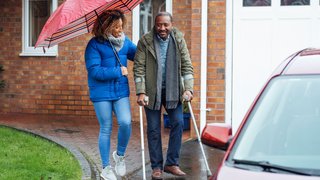
Keeping seniors and other vulnerable populations safe through social distancing is absolutely vital as COVID-19 spreads, but it’s also important to ensure they don’t drift into social isolation.
Common sources of stress for everyone during pandemics include a drop in meaningful activities, sensory stimuli, and social engagement. All of these stress points are heightened for seniors.
At UT Southwestern’s Department of Geriatric Medicine, we recommend to patients and their families several strategies to keep seniors safe and socially connected during the COVID-19 situation.
Here are six ways you can help older adults through the pandemic.
1. Schedule virtual family visits
Nursing home populations are among the highest risk groups being affected by COVID-19. The residents are older, many have underlying chronic medical conditions, and they also congregate in close quarters. The Centers for Disease Control and Prevention (CDC) has recommended tight restrictions on visitors, volunteers, and nonessential health care personnel.
Most group activities and communal dining have also been canceled at nursing homes and long-term care facilities. Changes such as these increase the need for social interaction for seniors.
Facetime, Skype calls, or other virtual visits that you share can prove invaluable. Consider setting up scheduled days and times to connect so the visits don't fall through the cracks, and so seniors have something to look forward to during the pandemic. Multiple family members can join using video conferencing tools such as Zoom, and nursing home staff can help the residents set up the call. Even a quick phone call a few times per week can help reduce feelings of social isolation for seniors who are sheltering in place.
2. Limit in-person visits to adults only
If you visit an elderly parent or grandparent in person, first it’s important to follow CDC guidelines on reducing the risk of spreading infection. Those precautions include washing your hands thoroughly, observing social distancing, and if you’re feeling even a little sick, cancel the visit. Also, it’s best right now not to include young children in the visit. They may lack the discipline and self-control necessary to maintain social distance from their grandparents. New research in the journal Pediatrics found that 13% of children with confirmed cases of COVID-19 did not show symptoms. For safety’s sake, let the youngest children say hello via a virtual family visit.

3. Be neighborly, check in on seniors
If you know an older person on your block whose risk may be elevated by a health condition, call them and see if they need anything when you are going to the store.
COVID-19 is aggressively contagious, spreading to an average of 2.5 people from one infected person, which means that a single trip by one person to fulfill the needs of multiple households can exponentially limit the risk of exposures. Offering to shop for an elderly neighbor will not only protect them and reduce the potential for spreading the infection, it will also help ease any anxiety they might be experiencing about running out of supplies or venturing out to the grocery store themselves.
4. Use television for more than news
Psychologists say all adults should balance time spent watching news with other televised programs. This is even more important with seniors, who have a tendency to remember and fixate on the most negative reports.
Premium cable and network channels offer classic movies and shows, including holiday-themed storylines that can be uplifting. Suggest that your elderly relative or friend limit the time they spend watching the news and instead offer some alternatives that you can both watch and discuss later.
5. Set up book clubs or discussion groups
Media is a great escape, and many seniors can exercise their minds by subsequently having engaging conversations with others about books and movies. For some variety, suggest that they listen to audio books or podcasts. Classics are a great source for this exercise, as seniors may have read these multiple times and have great recollections.
6. Write a letter or create an art project
Care packages and letters do wonders. Small tokens, printed photos, even art projects from a grandchild are wonderful gifts for seniors and constant sources of reassurance that you are thinking of them and they are remembered by their loved ones.
The COVID-19 threat and the ongoing uncertainty surrounding it are difficult for everyone, but for seniors the prospect of isolation is very real, and it can lead to depression, worsening physical health, increased stress, and cognitive changes.
Taking a few extra minutes out of your day for a phone call or to write a letter could make a world of difference.











